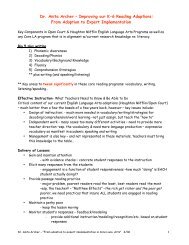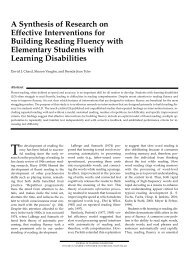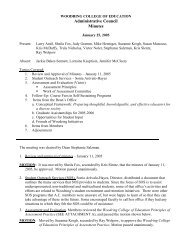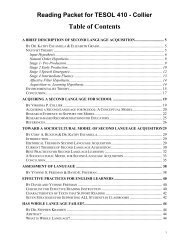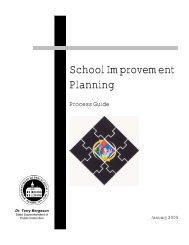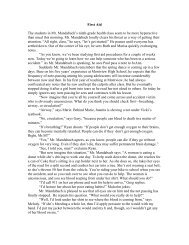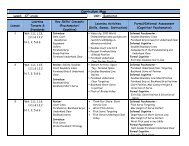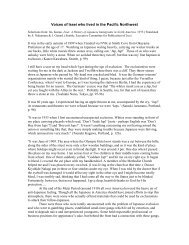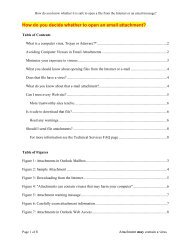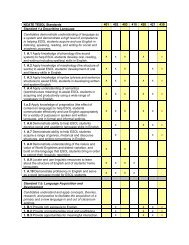Art Un ticle I.1 ited Sta In the ates News - Woodring College of ...
Art Un ticle I.1 ited Sta In the ates News - Woodring College of ...
Art Un ticle I.1 ited Sta In the ates News - Woodring College of ...
- No tags were found...
Create successful ePaper yourself
Turn your PDF publications into a flip-book with our unique Google optimized e-Paper software.
way <strong>of</strong> speaking a language. While all dialects <strong>of</strong> a given language are linguistically legitimate,some achieve social prestige. <strong>In</strong> literate, economically developed societies, <strong>the</strong> dialect spoken bythose with <strong>the</strong> most formal education, <strong>the</strong> highest socioeconomic status and <strong>the</strong> gre<strong>ates</strong>t degree<strong>of</strong> political power tends to acquire <strong>the</strong> gre<strong>ates</strong>t social prestige. Typically, it becomes <strong>the</strong> standardfor <strong>the</strong> culture, for writing and for education. <strong>Sta</strong>ndard dialects also provide a medium throughwhich persons from different linguistic backgrounds can communicate with one ano<strong>the</strong>r. Socialand regional variations may exist within standard dialects as long as <strong>the</strong>y conform to specifiedlinguistic rules, largely grammatical in nature. <strong>Sta</strong>ndard English, <strong>the</strong>refore, should not beconsidered "Nor<strong>the</strong>rn English" or "White English," since it is spoken, in one form or ano<strong>the</strong>r, inall parts <strong>of</strong> <strong>the</strong> <strong>Un</strong><strong>ited</strong> <strong>Sta</strong>tes and by some members <strong>of</strong> all racial and cultural groups. At <strong>the</strong> o<strong>the</strong>rend <strong>of</strong> <strong>the</strong> social spectrum, so called nonstandard dialects are generally spoken by <strong>the</strong> "havenots:" <strong>the</strong> powerless, <strong>the</strong> less educated, <strong>the</strong> less economically well <strong>of</strong>f and <strong>the</strong> less sociallyprominent. While legitimate linguistically, <strong>the</strong>se dialects tend to be unacceptable to <strong>the</strong> "haves"<strong>of</strong> society. <strong>In</strong> American English, nonstandard dialects exist within all racial, ethnic and regionalgroups ( see Table III ). Each dialect is a product <strong>of</strong> distinct social, historical, cultural andeducational factors. All are legitimate in that <strong>the</strong>y represent <strong>the</strong> concepts, needs and intentions <strong>of</strong><strong>the</strong>ir speakers.TABLE III Some Varieties <strong>of</strong> Nonstandard American EnglishAppalachian English"He just kept a begging and a crying and a wanting to go out." (He persisted in begging, cryingand wanting to leave.)Athabascan English (Alaska)"Most time we play games." (Most <strong>of</strong> <strong>the</strong> time we play games.)African American English Vernacular"He be scared, but I be brave." (He is usually scared, but l am usually brave.)General American Nonstandard English"don't nobody want none." (Nobody wants any.)Keaukaha English (Hawaii)"I no can place that name." (I cannot place that name.)New York City Nonstandard English"She's a good cook, your mo<strong>the</strong>r." (Your mo<strong>the</strong>r is a good cook.)Sou<strong>the</strong>rn American Nonstandard English"I mon' rest." (I am going to rest.)Spanish <strong>In</strong>fluenced English"Carol left yesterday. I think is coming back tomorrows." (Carol left yesterday. I think she iscoming back tomorrow.)For a variety <strong>of</strong> reasons, including negative public attitudes and inadequate teaching models,nonstandard English speakers <strong>of</strong>ten do not effectively learn standard English in school. Withoutcompetence in standard English, students will fail academically and face diminished career,social and life options. Many students who do learn standard English do so at a great price:devaluation or rejection <strong>of</strong> <strong>the</strong>ir home or community dialect. When competence in standardEnglish is coupled with rejection <strong>of</strong> one's own home or community dialect, it may lead to seriouspsychological and identity problems (Chambers, 1983). <strong>In</strong> <strong>the</strong> <strong>Un</strong><strong>ited</strong> <strong>Sta</strong>tes, <strong>the</strong> schools' failure© 2008 Dr. Ca<strong>the</strong>rine CollierAll Rights Reserved60




